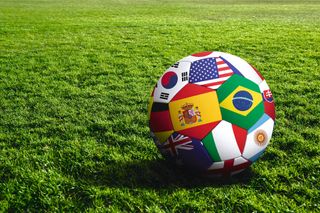The 2022 FIFA World Cup is taking place in Qatar from November 20 to December 18. The best-known men’s soccer – or football, as it’s known outside of the U.S. – tournament on the planet, this massive sporting event will draw dozens of national teams from around the globe as well as thousands of spectators and millions of viewers.
As one of the largest international athletic competitions, the FIFA World Cup is a great opportunity to teach about other cultures, geography, traditions, and much more. These lessons, activities, quizzes, worksheets, and more -- almost all of which are free -- have the goooooool (!) of engaging students in the excitement.
Best FIFA World Cup Lessons & Activities
The New York Times: Spot The Ball
Soccer is a fast-paced game, but a true fan will not only follow the ball, but also anticipate its trajectory. This interactive from The New York Times is a fun test of the reader’s soccer acumen.
Physics of Soccer: The Science Behind Free Kicks, Penalties, and Goal Kicks
Underlying the thrill of World Cup competition are some serious principles of physics. This entertaining video combines real action on the soccer pitch with a lesson on the science and equations that determine the trajectory of the ball—and the ultimate winner.
World Cup 2022 Teaching Resources
Explore a wealth of lessons related to the FIFA World Cup 2022 competition, in subjects ranging from English language arts to math to social studies. Searchable by standard, grade, subject, and resource type, these free and modestly priced lessons have been created and vetted by your fellow teachers.
Soccer Physics
How does the inflation of the soccer ball affect its motion? Soccer players and fans of American football may intuitively know the answer, but can they explain it according to physics? This free step-by-step science project includes detailed research questions and experimental procedures. Students will learn about the experimental method, the physics of soccer and who can kick the ball the farthest.
ESOL Courses: The FIFA World Cup
In addition to vocabulary tests, spelling jumbles, language worksheets, and country identification quizzes, this site offers students the opportunity to learn English through national football songs, including Shakira’s “Waka Waka.”
Twinkl: The 2022 Men’s World Cup Teaching Ideas & Resources
This site offers the history of the World Cup as well as fun facts, plus downloadable interactives, worksheets, card games, flashcards, puzzles, and more.
Rebecca, The Irish Teacher FIFA World Cup 2022 Activity Pack
Designed primarily for grades 1-6, this site includes a variety of activities and worksheets, including “Design your own jersey,” flag-and-nation matching, flag-coloring activities, and soccer/football vocabulary building tasks.
Busy Teacher: 40 Free World Cup Worksheets
Some of these worksheets date back to previous tournaments, but there is still plenty of evergreen content here, including nation quizzes, vocabulary tests, flag identification, national football song sheets, word searches, and more.
Etacude English Teachers: 10 World Cup Classroom Activities & Games
This video features 10 World Cup-related activities teachers can utilize in their classes including World Cup worksheets and vocabulary. Younger learners can create soccer-themed crafts such as a blow soccer pitch and research important events in World Cup history.
Why is Qatar Controversial Location for the World Cup?
Older students can discuss the controversies around this year’s host nation, Qatar. Critics of the choice have pointed to the country’s treatment of migrant workers and its lack of women’s or LGBTQ+ rights. This story provides an overview of these concerns.
Qatar’s History
The World Cup is a good opportunity to teach the geography and history of the host nation, which is located on the Arabian Peninsula and shares a border with Saudi Arabia. The Associated Press provides a quick but informative history of the nation.
5 Lessons for Teachers From Ted Lasso
Our favorite fictional soccer coach isn’t involved with the World Cup (as far as we know), but the international soccer tournament is the perfect time to revisit the lessons educators can learn from the mustached Yankee who makes up for his lack of soccer knowledge with kindness and curiosity.
This features a fast-paced mini soccer tournament designed by Paul Gannon, an instructor in the Department of Physical Education at the U.S. Military Academy in West Point. It’s a fun activity for any teacher who wants to bring students outdoors and focus on teambuilding and exercise.

